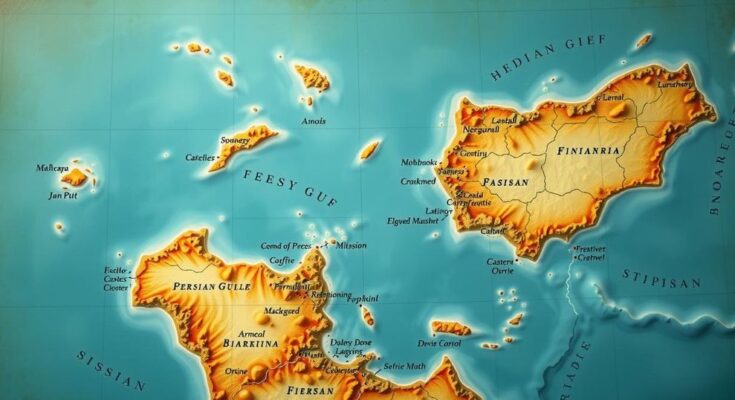Iran is citing 19th-century British maps to assert its claim over three islands disputed with the UAE at the Strait of Hormuz. This has escalated tensions with Gulf states and complicated Iran’s relations with the EU, especially following the EU’s recent condemnation of Iran’s territorial control. Iranian officials argue the islands have always belonged to Iran, but challenges persist as the UAE seeks international support for its claims.
Iran has invoked 19th-century British maps in an escalating dispute with Gulf states surrounding the ownership of three strategically significant islands at the Strait of Hormuz. Maps produced in 1888 under the British Marquess of Salisbury indicate that these islands were historically recognized as part of Iran, countering claims from the United Arab Emirates (UAE). The dispute risks straining Iran’s diplomatic endeavors within the Gulf region and complicates its relations with the European Union, particularly following recent condemnations from the EU regarding Iran’s control of these islands. The disagreement is sensitive for Iran, exacerbated by the EU’s endorsement of UAE claims during a Council summit last month. Iranian officials have highlighted the 1888 War Office maps, asserting that at that time, areas now comprising the UAE were referred to as the “Pirate Coast.” The three islands in question—Abu Musa, Greater Tunb, and Lesser Tunb—are pivotal to oil shipping routes from the Gulf and have been a point of contention since Britain’s withdrawal from its protectorate status in 1971. Post-1971, Iran seized the islands, maintaining a military presence, particularly on Abu Musa, which is inhabited. The UAE has sought international arbitration to address this territorial claim, with the backing of the UN Security Council; however, Tehran has resisted third-party intervention. Recent statements from Iranian officials reflect a defensive posture regarding the islands. Foreign Minister Abbas Araghchi stated, “The three islands have always belonged to Iran and will forever remain as such,” criticizing European interference. Iran’s parliament speaker adopted a more aggressive tone, urging Gulf Cooperation Council members to focus on regional conflicts rather than challenging Iran’s territorial claims. This bilateral strain comes at a time when Iran is attempting to forge alliances against external threats, particularly Israel, underscoring the complexity of regional geopolitics and historical narratives that influence current affairs around the islands.
The dispute over the ownership of Abu Musa, Greater Tunb, and Lesser Tunb islands traces back to 19th-century geopolitical considerations and colonial maps. The islands, situated at the entrance to the vital Strait of Hormuz, control passage for a significant portion of the world’s oil supply, elevating their importance in contemporary politics. The longstanding claims by both Iran and the UAE underscore the intricate relationship between historical context and modern diplomacy, particularly in the wake of shifting alliances and geopolitical strategies in the Middle East.
In summary, the reference to historical British maps underscores Iran’s assertion of sovereignty over disputed islands, amidst rising tensions with Gulf states and the European Union. The developments signal a precarious balance in regional relations, with Iran seeking to defend its territorial claims while managing an evolving diplomatic landscape influenced by both historical legacies and contemporary geopolitical realities. The ongoing struggle over these islands highlights the complexities of sovereignty and international law in the context of historical disputes.
Original Source: www.theguardian.com




